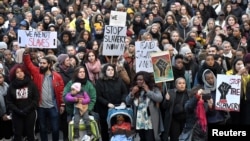Rights group Amnesty International says European nations are taking steps to prevent refugees and migrants from crossing the Mediterranean Sea from Libya, trapping them in a system that exposes them to torture and abuse.
In a report issued Tuesday, Amnesty says European governments are "knowingly complicit" because they give technical support to Libya's Department Combating Illegal Migration, give training and equipment to Libya's Coast Guard and make agreements with local authorities and armed groups to encourage efforts to stop human smuggling.
"Hundreds of thousands of refugees and migrants trapped in Libya are at the mercy of Libyan authorities, militias, armed groups and smugglers often working seamlessly together for financial gain. Tens of thousands are kept indefinitely in overcrowded detention centers where they are subjected to systematic abuse," said Amnesty International Europe Director John Dalhuisen.
Faced with an influx of refugees and migrants in recent years, European nations have responded with measures such as closing borders and working with governments on the other side of the Mediterranean to try to prevent people from making what can be a dangerous crossing. More than 3,000 people have died trying to make the trip this year.
The International Organization for Migration said Tuesday that so far in 2017 the number of migrants and refugees entering Europe by sea was down 53 percent compared to the same period last year. About 70 percent of the 166,000 arrivals landed in Italy.
The top countries of origin are Nigeria, Guinea, Ivory Coast and Bangladesh.
Amnesty International based its report on interviews with 72 refugees and asylum seekers in Italy and Tunisia, as well as meetings with Libyan officials and United Nations representatives.
The report says the European Union and its members "have pursued their own goal of restricting the flow of refugees and migrants across the Mediterranean with little thought, or seeming care, for the consequences for those trapped in Libya as a result."
"European governments have not just been fully aware of these abuses; by actively supporting the Libyan authorities in stopping sea crossings and containing people in Libya, they are complicit in these abuses," Amnesty said.
Italy's Foreign Minister Paolo Gentiloni said his government can be proud of its treatment of migrants, and that its efforts have helped shine a light on the human rights situation in Libya.
EU foreign policy chief Federica Mogherini told the European Parliament that while the EU should have taken action earlier, it has been engaged on the issue for several years.
"I've said many times that our goal is to close the detention centers," Mogherini said. "We need to give these people the opportunity to leave Libya, safely, toward a better life"
She said this year the EU has assisted more than 15,000 migrants who were trapped in Libya. Mogherini also acknowledged that returning home is not an option for people who face war or persecution, saying there is a need to "open new avenues to come to Europe or other safe places."





